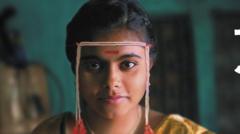The year 2024 marked a significant shift in Indian cinema, focusing on narratives led by women that resonate globally. With Payal Kapadia's "All We Imagine As Light" clinching top honors at Cannes and fellow filmmakers like Shuchi Talati and Kiran Rao also making waves, the impact of feminist storytelling on Indian films signals a departure from traditional Bollywood norms. These films explore themes of gender, identity, and resilience, fostering a sense of connection that transcends cultural boundaries and setting the stage for a more diverse cinematic future.
Feminism Sparks a Revolution in Indian Cinema, Winning Hearts Worldwide in 2024

Feminism Sparks a Revolution in Indian Cinema, Winning Hearts Worldwide in 2024
In 2024, feminist narratives and independent films by women filmmakers take center stage, reshaping India's cinematic landscape and gaining international acclaim.
In 2024, the global landscape of Indian cinema witnessed an intriguing transformation as smaller films created by female directors opened a dialogue that went beyond the traditional Bollywood fare. As major commercial films faltered, the spotlight shone brightly on stories that delved deeper and explored the complexities of the female experience.
A standout success in this narrative was Payal Kapadia's critically acclaimed "All We Imagine As Light," which made history by securing the Grand Prix at the Cannes Film Festival. Since its triumph, it has gained momentum, earning accolades from prestigious bodies such as the New York Film Critics Circle and boasting multiple Golden Globe nominations, including Best Director for Kapadia. The film has consistently appeared in 'Best Of' lists compiled by renowned platforms, including the BBC and the New York Times.
Alongside Kapadia's work, Shuchi Talati's coming-of-age film "Girls Will Be Girls" captured audiences at the Sundance Film Festival, securing two awards there. Kiran Rao's "Laapataa Ladies" achieved commercial success on Netflix in India before its selection as the country's official Oscar entry, despite facing some criticisms. Interestingly, British-Indian director Sandhya Suri’s "Santosh," centered on violence against women, was the UK’s submission for the Oscars, proving that narratives from South Asia can gain traction on the global stage.
Film critic Shubhra Gupta describes these achievements as the result of a long journey rather than an overnight phenomenon. The filmmakers have dedicated years to crafting their narratives, with Talati and her co-producer, Richa Chadha, having conceived their project back in college.
The themes presented in these films resonate on a universal level. "All We Imagine As Light," which intertwines Hindi, Marathi, and Malayalam languages, follows three migrant women in Mumbai as they navigate issues of love, resilience, and societal challenges. Kapadia highlights the political undercurrents in Indian love stories, noting how personal choices are often entangled with familial honor and societal expectations.
"Girls Will Be Girls," in turn, explores the tumultuous journey of adolescence through the lens of a 16-year-old girl grappling with her own relationships and inner conflicts. Gupta emphasizes the film's fresh perspective on female experiences amid a world often dominated by male narratives.
Despite mixed box-office outcomes, Rao’s "Laapataa Ladies" has been praised for its sharp social commentary against the grain of traditional stories. Aamir Khan, a co-producer, pointed out the necessity for mutual understanding and growth in challenging patriarchal mindsets. The film humorously addresses themes of identity and gender roles, setting a precedent for films that provoke thought while still entertaining.
The unexpected nomination of Suri’s "Santosh" as the UK's Oscar entry illustrates a burgeoning intersection between diverse narratives across borders. The film, produced with a largely female crew, draws on the shared experiences of women while melding Indian and global perspectives, showcasing the potential for cross-cultural storytelling.
The rise of these films reflects a notable cultural shift within Bollywood, with franchises like "Stree 2" earning major financial success while promoting female-driven narratives. Similarly, Netflix's "Heeramandi," exploring the lives of courtesans in pre-independent India, resonated powerfully with audiences.
Together, these developments underline a crucial moment for female voices in Indian cinema. Their triumphs in 2024 signal an expanding sphere for independent films, enhancing their visibility and paving the way for a more equitable cinematic environment that resonates with broad audiences.





















